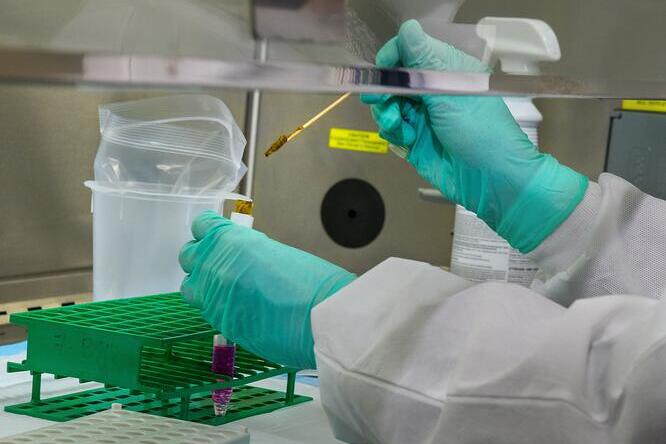How bugs and chemicals in your poo could give away exactly what you’ve eaten

Fecal analysis could help deliver personalized, microbiome-based diet advice.
Feces are good for so much more than flushing.
Yes, our waste contains the stuff that our bodies are generally trying to get rid of. But it can also provide insight into our gut microbiomes and how they influence our health. And we’re getting closer to understanding the impact of individual foods.
The gut microbiome is the name we give to the community of microbes that make a home in our insides. These bugs end up in our stool, as do the many chemicals they produce
Scientists are getting better at collecting and making sense of this data. This week, I came across a fascinating study in which researchers tried to tell whether people had eaten individual foods—avocados, walnuts, broccoli, and others—just by analyzing their poo. For some of these foods, accuracy was upwards of 80%.
The scientists behind the work want to use this approach to aid research. But we could potentially use the same approach to improve our health. Other researchers hope to use stool analysis to provide people with personalized, microbiome-based diet advice, for example.
Our guts are home to billions of microbes, and the makeup of our microbiome is linked to our diet. You see different populations of bugs in vegetarians and people who eat a lot of meat, for example. It’s likely that microbes make a home where there is food for them to eat. And some might thrive on specific foods or their breakdown products.
But when it comes to the details, we’re still figuring out exactly how the relationships between diet, microbiome, and health work. Alterations in the microbiome have been linked to multiple diseases, including irritable bowel syndrome, Parkinson’s disease, and arthritis, to name a few.
Last year, Eran Elinav at the Weizmann Institute of Science in Israel and his colleagues showed that sweeteners can influence our microbiomes—and that the changes can alter the way our bodies respond to sugar. Put these altered microbiomes into mice—via fecal transplant—and the animals develop the same issues.
This kind of research shows how we might be able to alter our microbiomes for the better, says Sarah Berry, who studies the impact of diet on metabolism at King’s College London. Factors such as your genes or the timing of your meals also influence how your diet affects your health, but the microbiome is “a very important piece of the puzzle,” she says.
Berry and her colleagues are trying to work out exactly how diet might influence the microbiome and, in turn, people’s health. And to find out, they’re turning to poo. As part of ongoing research, the team is collecting fecal samples, as well as dietary information and health data, from over a thousand volunteers.
A couple of years ago, the team published a study demonstrating how clues in the microbiome might indicate what a person had consumed. For that study, the researchers looked for the presence of microbes in feces. Then they attempted to link those with the presence of certain food groups, such as fruits, legumes, and “healthy plants,” in a person’s diet.
We’re crawling with microbes, and scientists want to use them to treat disease.
It was tricky to find specific bugs associated with specific foods, but the presence of one particular microbe was a strong indicator of whether or not a person had been drinking coffee. Basically, if you’re a coffee drinker, a microbe in your feces will give you away.
The new study, by Hannah Holscher at the University of Illinois at Urbana-Champaign and her colleagues, takes a slightly different approach. Here, the team looked at fecal samples from volunteers who ate set amounts of specific foods on a daily basis. And rather than look at the presence of microbes themselves, Holscher’s team looked for metabolites—the chemicals microbes produce when they break down food.
The team looked at the impact of six specific foods: almonds, avocados, broccoli, walnuts, barley, and oats. The researchers first looked to see if there were any links between metabolites in poo and whether a particular person had eaten any of these foods. They used any patterns they identified to guess whether other people had eaten the same foods.
Again, it was tricky—but the team was able to tell whether people had eaten almonds, broccoli or walnuts with 80 to 87% accuracy, depending on the food. The study was published online at the preprint server bioRxiv and has not yet been peer-reviewed. But it builds on similar work the team published last year.
Studies like these provide a tantalizing glimpse into the potential future of fecal analysis. It’s early days, and the accuracy of these tests is likely to improve over the coming years. But the ability to understand the impact of individual foods on our microbiomes, and our health, could revolutionize research and nutrition. “This is really the frontier of what’s next,” says Emily Leeming, a nutrition scientist at Zoe, the maker of a personalized nutrition app, who coauthored Berry’s study.
Holscher’s team hopes to improve nutrition research. Studies that aim to figure out how certain foods affect our health usually rely on volunteers to keep food diaries. They’re a pain to maintain, and they’re usually inaccurate or incomplete. Analyzing a person’s poo instead could one day provide a painless alternative.
But fecal analysis could potentially be used to improve a person’s health more directly. Berry and her colleagues are working on ways to develop personalized dietary advice for people from the state of their microbiome, as estimated via stool sample analysis.
In theory, scientists might one day be able to provide diet recommendations designed to target specific microbes, and potentially guide the production of specific metabolites that might influence our appetites, metabolism, or even our moods, says Leeming.
“There’s so much you can learn from someone’s poo,” she says.